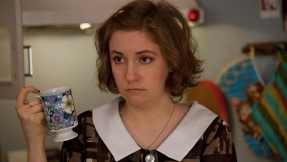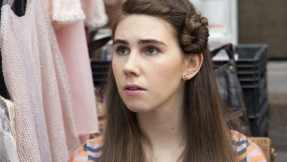Are the women in Girls (TV series) Commendable?
In two seasons, Girls has established itself as a cracking and thought-provoking show. Smart, sensitive, and realistic – the show has held a mirror up to society and proven that we should all look out for one another. For those who haven’t heard of the show, there are three things you need to know about it. First, a lot of whinging is involved. Second, It involves a wave of bland, washed out tones. Third, many characters get naked at some point or another. Many critics have failed to look past these three elements; citing its hipsterness as the cause of all problems affecting modern TV! I believe the show’s characters are what make it whole. They may be silly sometimes, but isn’t everyone at some point or another? Some of us are even sillier than the characters on this show (myself included)! All four main characters represent different emotional states (states of mind or being). I recently looked back on the first two seasons to determine how and why so many people consider these characters to be annoying, selfish, and even disgusting. Hopefully, this will convince others that a. this show is effective, and b. we should embrace who and what the people around us want to become.
Hannah Horvath (Lena Dunham)
 Hannah may be a layabout, but she represents people who believe they have tried and failed to conquer the world. Everyone has felt this way at some point or another. Despite her obsession with what everyone else thinks, Hannah tries to succeed but can’t find the right words or pathways to do so. Hormones and self-esteem issues affect everyone to a certain extent at some point in their lives. Hannah is a walking time bomb. This is no more evident than in the first scene of season one. While her parents talk to her over dinner about cutting off her financial ties, she freaks out and begins to wonder who or what she is. From this episode onwards, she transforms from a whiny, self-conscious person, to an even more self-conscious person, to an optimistic and sweet individual. Battered (figuratively) by her strange boyfriend Adam (Adam Driver), she attaches herself to him before he can decide whether or not he wants her. Despite her abrasive attitude and multitude of errors, she does care about her friends and wishes for them to be successful. In the first season, her falling out with Marnie is realistic and punishing. Despite being in the wrong, her decisions are reminiscent of impulsive choices young people make everyday. She uses her sexuality to prove why and how she is important to people around her. Getting naked in every episode, her erotic interludes with Patrick Wilson and Donald Glover’s characters allowed us into her psyche and strip the character bare in more ways than one.
Hannah may be a layabout, but she represents people who believe they have tried and failed to conquer the world. Everyone has felt this way at some point or another. Despite her obsession with what everyone else thinks, Hannah tries to succeed but can’t find the right words or pathways to do so. Hormones and self-esteem issues affect everyone to a certain extent at some point in their lives. Hannah is a walking time bomb. This is no more evident than in the first scene of season one. While her parents talk to her over dinner about cutting off her financial ties, she freaks out and begins to wonder who or what she is. From this episode onwards, she transforms from a whiny, self-conscious person, to an even more self-conscious person, to an optimistic and sweet individual. Battered (figuratively) by her strange boyfriend Adam (Adam Driver), she attaches herself to him before he can decide whether or not he wants her. Despite her abrasive attitude and multitude of errors, she does care about her friends and wishes for them to be successful. In the first season, her falling out with Marnie is realistic and punishing. Despite being in the wrong, her decisions are reminiscent of impulsive choices young people make everyday. She uses her sexuality to prove why and how she is important to people around her. Getting naked in every episode, her erotic interludes with Patrick Wilson and Donald Glover’s characters allowed us into her psyche and strip the character bare in more ways than one.
Marnie Michaels (Allison Williams)
 Marnie may be the series’ most annoying and self-centred character. From the very beginning, she manipulates and lies to everyone around her. This type of girl may exist in real life, but that doesn’t make them interesting and/or likeable. From the first episode, it’s clear she doesn’t like her current boyfriend. despite being a nice guy who has been dating her since high school, she pushes their relationship along because she is self-centred and afraid of change. Admittedly, this occurrence is common. However, Marnie’s manipulative and dirt-cheap tricks only suit her. From then on, she proceeds to have make-up/break-up sex with him, whine about her job prospects, sleep around, and whine some more. Her appearance is one of many positive aspects that she frustratingly fails to notice. Her character may have realistic traits, but she fails to grasp why people around her treat her the way they do. However, season 2 shows a naively sensitive side to her. She soon becomes jealous of her ex-boyfriend’s success and seeks redemption and solace. Her character becomes slightly charming, despite stupidly getting on stage and singing Kanye West’s ‘Stronger’ at a party. Despite this behaviour, she is slowly coming into her own and becoming a much more likeable human being.
Marnie may be the series’ most annoying and self-centred character. From the very beginning, she manipulates and lies to everyone around her. This type of girl may exist in real life, but that doesn’t make them interesting and/or likeable. From the first episode, it’s clear she doesn’t like her current boyfriend. despite being a nice guy who has been dating her since high school, she pushes their relationship along because she is self-centred and afraid of change. Admittedly, this occurrence is common. However, Marnie’s manipulative and dirt-cheap tricks only suit her. From then on, she proceeds to have make-up/break-up sex with him, whine about her job prospects, sleep around, and whine some more. Her appearance is one of many positive aspects that she frustratingly fails to notice. Her character may have realistic traits, but she fails to grasp why people around her treat her the way they do. However, season 2 shows a naively sensitive side to her. She soon becomes jealous of her ex-boyfriend’s success and seeks redemption and solace. Her character becomes slightly charming, despite stupidly getting on stage and singing Kanye West’s ‘Stronger’ at a party. Despite this behaviour, she is slowly coming into her own and becoming a much more likeable human being.
Jess Johansson (Jemima Kirke)
 Despite having a limited amount of screen time, Jess is the most outlandish character in the show. Her trippy philosophies and ‘free as a bird’ attitude are puzzling yet intriguing parts of a heavily damaged psyche. In season 1, her babysitting job is tested when the father falls for her beauty and sluttiness. Certain episodes then focus on the painful decisions she makes and hearts she will inevitably break. The character may act like she is high on lithium, but her raw honesty keeps the audience invested. Jess and the other characters (Hannah, in particular) bond over many silly incidences and memories while the future becomes increasingly bleak. Her rushed marriage with Chris O Dowd’s character is another important factor. Here, Jess pushes everyone away. But, unlike other female characters on TV, she admits wholeheartedly to having dark and crippling issues. Her selfish ways then become a part of the season 2’s overall narrative structure. In one episode, Hannah and Jess visit Jess’ father and his new family. This touching episode, bolstered by Ben Mendelsohn’s scene stealing performance, brings Jess’ human side to the forefront. Whether or not she’s a morally driven individual, her vibrancy and warmth lend this show an aura of care and sensitivity.
Despite having a limited amount of screen time, Jess is the most outlandish character in the show. Her trippy philosophies and ‘free as a bird’ attitude are puzzling yet intriguing parts of a heavily damaged psyche. In season 1, her babysitting job is tested when the father falls for her beauty and sluttiness. Certain episodes then focus on the painful decisions she makes and hearts she will inevitably break. The character may act like she is high on lithium, but her raw honesty keeps the audience invested. Jess and the other characters (Hannah, in particular) bond over many silly incidences and memories while the future becomes increasingly bleak. Her rushed marriage with Chris O Dowd’s character is another important factor. Here, Jess pushes everyone away. But, unlike other female characters on TV, she admits wholeheartedly to having dark and crippling issues. Her selfish ways then become a part of the season 2’s overall narrative structure. In one episode, Hannah and Jess visit Jess’ father and his new family. This touching episode, bolstered by Ben Mendelsohn’s scene stealing performance, brings Jess’ human side to the forefront. Whether or not she’s a morally driven individual, her vibrancy and warmth lend this show an aura of care and sensitivity.
Shoshanna Shapiro (Zosia Mamet)
 As (essentially) a sex-obsessed chipmunk, Shoshanna is used as background dressing in many episodes. However, her manic charm and loving side make her the show’s most interesting character. In the first season, she is discovering the world and her wavering inhibitions. A virgin at 24, her seemingly promiscuous friends decide that she is just fine the way she is (a bold move that separates this show from others of its type). Throughout the season, she decidedly finds a place to call home and strives to find things that will give her happiness (including her new boyfriend). She is also a hilarious counterpart to Hannah. Hannah’s soft personality is met with Shoshanna’s ‘and then…and then…and then…’ way of speaking. Rushing into every situation, Shoshanna embodies the manic persona of many girls her age. However, she successfully avoids becoming a Sex and the City type character (a show referenced in the first episode) and amiably finds her calling. There is one episode in particular that establishes her as hilarious and thoughtful. Her drug-related freakout ably establishes her as a sweet yet lively person afraid of being unafraid.
As (essentially) a sex-obsessed chipmunk, Shoshanna is used as background dressing in many episodes. However, her manic charm and loving side make her the show’s most interesting character. In the first season, she is discovering the world and her wavering inhibitions. A virgin at 24, her seemingly promiscuous friends decide that she is just fine the way she is (a bold move that separates this show from others of its type). Throughout the season, she decidedly finds a place to call home and strives to find things that will give her happiness (including her new boyfriend). She is also a hilarious counterpart to Hannah. Hannah’s soft personality is met with Shoshanna’s ‘and then…and then…and then…’ way of speaking. Rushing into every situation, Shoshanna embodies the manic persona of many girls her age. However, she successfully avoids becoming a Sex and the City type character (a show referenced in the first episode) and amiably finds her calling. There is one episode in particular that establishes her as hilarious and thoughtful. Her drug-related freakout ably establishes her as a sweet yet lively person afraid of being unafraid.
Whether they be manic pixie dream girls or frightened loners, the characters in Girls have traits that everyone can relate to. These characters have changed drastically throughout seasons 1 and 2; choosing to see the seeing the bright side of life beyond the darkness. The end of season 2 depicts the four lead characters as independent, unique women – transforming themselves beyond the promise of the show’s title.
What do you think? Leave a comment.











I like this show a lot. I think that this show is feminist in that it kind of challenges those molds. Here the main character isn’t very likeable, but she isn’t conventionally attractive, either. She has a lot of sex, and she shows a body that isn’t going to get a lot of men hot and bothered.
Girls actually reminds me more of How to Make It In American than Sex and the City. As a woman, SATC always bothered me because Carrie was neurotic and not believable. In addition, the women of SATC were in their late thirties/early forties most of the series so they had time to establish themselves. The shoes were great but the relationships in that show were far-fetched. Hannah and the crew are definitely twenty-somethings. They are fresh out of college and have no idea what they are doing romantically or career-wise.
You have a good mix of characters. They seem natural and tangible. I actually like this, in terms of relatability, a lot more than some of the other stuff on TV.
I agree ‘Girls’ characters are a lot more relatable than a lot of other female characters on TV, and it’s definitely because they’re more complex. In that way, I think they’re more anti -Manic Pixie Dream Girls (MPDG). Each character has these honest, cringe-worthy moments; they’re selfish, make bad decisions and get terrible haircuts. They have depth which is the opposite of the old MPDG. In this New Statesman article (I recommend looking it up, it’s great!) Laurie Pennie says “Averagely pretty white women in their late teens and twenties are not the biggest, most profoundly unsolvable mystery in the universe… The one abiding secret about us is that we’re not fantasies, and we weren’t made to save you: we’re real people, with flaws and cracked personalities and big dreams and digestive tracts.” I think ‘Girls’ gets that.
Hannah Horvath is annoying, selfish, and disgusting, but no more than Walter White. The great thing about ‘Girls’ is that the characters are complex human beings with flaws as well as admirable traits. The show doesn’t speak for a generation, nor does it speak for a gender. It speaks for its characters who are fictional but in many ways resemble our lives because we, like them, are flawed. The gender question is interesting but I don’t think it needs to be asked every single time with every single show about women. When we do that, we tend to dismiss certain shows like this or Sex and the City because they don’t adhere to ideas of female behavior, but both shows are great achievements and are worthy of a discussion that goes beyond gender.
Girls is a brilliant show, but I feel like every time I start getting attached to any other character besides Hannah, they yank her away and don’t bring her back for several episodes. Each character is both lovable and loathable, but I agree that Marnie is probably the most annoying one. Yet, I still like her.
Good analysis.
I’ve only watched one season, but I’m offended by the description of Marnie, considering she’s the one I relate to the most. I was once in a relationship with an incredibly doting boyfriend, who I knew would move the earth for me if he had to, and I still wasn’t happy because we weren’t compatible in the long run. In spite of how he treated ME, there were things he did and said that I was not OK with. I don’t know why recognizing that something isn’t working and breaking things off to make yourself happier is “selfish.” Are you supposed to stick it out to make THEM happy? Granted … I didn’t do the make-up/break-up sex thing or sleep around, or get all high and mighty when he got a new girlfriend, but I can definitely relate to how it feels when you want to break up with someone who everyone in the outside world thinks is “perfect.” You feel bad, and you don’t want to hurt them, so you stick it out longer than you probably should. Maybe it’s less about being “self-centered and afraid of change” and more about feeling guilty that you want to end a relationship that most people would love to have.
And it’s not mentioned in the article, but in her fight with Hannah towards the end of S1 … I’m also on her side and can relate. She’s living with a girl who isn’t pulling her weight financially and isn’t contributing to her share of the rent and bills. Hannah is basically living in “Marnie’s” apartment for free, eating Marnie’s food, and inviting Adam to stay the night constantly (who ALSO isn’t paying rent and is ALSO eating their food). And then Hannah comes home and all she wants to do is talk about HER problems. That’s unacceptable. Why should Marnie have to foot the bill because Hannah refuses to get a menial job to pay her way? Just my opinion, but Hannah’s the selfish one in that relationship. If your career isn’t going the way you want, that’s too bad. But that doesn’t absolve you of your responsibility to pay your way. You do what you have to do, even if it means working at McDonalds with a college degree.
Personally, I find all the girls to be relatable except for Jessa. But I’ve never actually known anyone like her, so that’s probably why.
Natalia was the most together, likable girl. Hopefully she’ll be back. I loved the scene with Adam when she corrects him when he calls her a whore (?). Refreshing.
When it comes to Marnie and Hannah… I have been in Marnie’s EXACT position – financially supporting a friend who refuses to “lower” herself to a menial job to pay her own way … but is perfectly fine living off of someone else, so I feel like I can really relate. The same thing happened with me. I let it go, for a LONG time. I didn’t bring it up, because in my mind, it went like this: “She’s my best friend. She knows it’s not right that she’s living off of me. She’ll get a job soon, she’ll get her s**t together and everything will be fine again. I don’t have to say anything because she knows what’s happening isn’t fair and she feels bad enough about it. Bringing it up would just make her feel worse.”
I was in denial, I’ll flat-out admit that. And when I finally DID bring it up, it was because there was a “trigger” that made me explode. Long story short: we had it split so the rent came out of my account and the utilities came out of hers, and then she paid me the difference (since the rent amount exceeded that of the utilities). Well, she didn’t pay the power bill (and also didn’t tell me that she didn’t pay it) and then she went away with her boyfriend for the weekend, and guess what? The electric company turned the power off. Her cell phone was out of range so I couldn’t get a hold of her to get the account number to pay a portion of the bill to get the power back on, so I had to go stay with my parents because I was without electricity. When she came back on Monday, I lost my s**t and brought up EVERYTHING, which included her not paying rent, her prioritizing weekend getaways with her boyfriend over getting a job and paying the bills, her not ever being around or available when s**t like this happens (it wasn’t the first time), her not doing her share of the cleaning… EVERYTHING. It was a bad scene.
At the end of season two I went around asking fellow viewers: How much “Seinfeld” is there in “Girls”? Meaning: it was made clear, if it wasn’t already clear, in the series finale that “Seinfeld”‘s creators saw the four main characters as satirical exaggerations of narcissism and selfishness, in need of societal sanction; does “Girls” feel the same way about its main characters and their obnoxious, self-forgiving, self-involved, and finally, selfish, ways? Are these characters meant as ironic commentary on the Millennials, or are they a sympathetic representation of the (ostensibly) difficult trials of young adulthood? I asked the question with more than a bit of concern, as several friends have mentioned how their college daughters adore the show, and find it to be very realistic and representative of their experience. I worry that the show, lacking satire, is instead affirming an entire generation of Hannah Horvaths. And I find that notion fairly terrifying. And p.s. by the strictest definitions, I am actually a Millennial. So this isn’t a, “What’s wrong with kids these days comment?” so much as a, “What’s wrong with you all?” comment.
The female characters are a bit of a train wreck to watch and often highly unlikable in the selfish, awkward and sometimes unrealistic ways they deal with the world and each other; however, their complexity and rawness is what keeps pulling the audience back into the show. GIRLS’ non-glamorous look and feel is precisely what makes it stand out from other female-centric shows like SATC.
The buried lede of Girls seems to be the state of finance on the part of young adults (i.e. living in a hole-in-the-wall bungalow with less than ideal roommates. It arguably is a sadder aspect that illuminates other melancholy ones.